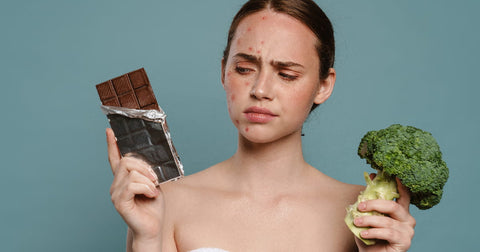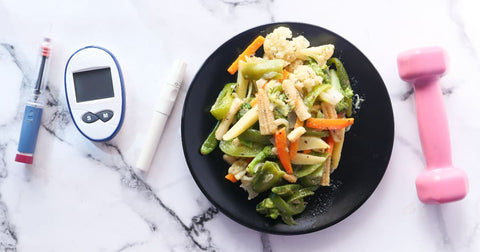Acne, a common skin condition characterized by pimples, blackheads, and inflammation, can be a frustrating and persistent problem. While genetics, hormones, and skincare routines play a role, your diet can also significantly impact your skin health.

If you're struggling with acne, you might be wondering, "What foods cause acne?" This comprehensive guide will explore the link between your diet and breakouts, delve into the inflammatory effects of certain foods, and offer insights into how food intolerances might be contributing to your skin concerns.
The Gut-Skin Connection: How Food Impacts Your Complexion
The gut-skin axis is a bidirectional communication pathway between your gut microbiome (the community of bacteria in your gut) and your skin. An imbalance in your gut bacteria, often caused by dietary choices, can trigger inflammation throughout your body, including your skin. This inflammation can manifest as acne, eczema, or other skin problems.
Foods That Cause Acne: The Usual Suspects
While individual triggers vary, these foods are often associated with acne flare-ups:
1. Sugary Foods and Drinks:

-
Does sugar cause acne? Yes, sugar is a major culprit in promoting inflammation and increasing sebum (skin oil) production, which can lead to breakouts. Limit sugary drinks, sweets, and processed foods with hidden sugars.
2. Dairy Products:
-
Does cheese cause acne? Dairy products, including cheese, can trigger inflammation and hormonal fluctuations in some individuals, contributing to acne. If you notice a link between dairy and your breakouts, consider reducing your intake or trying dairy-free alternatives.
3. High-Glycemic Foods:
-
White bread, white rice, and processed snacks: These foods cause rapid spikes in blood sugar, similar to sugar, potentially triggering inflammation and breakouts.
4. Saturated and Trans Fats:
-
Fried foods and processed meats: These unhealthy fats can promote inflammation and worsen acne.
5. Chocolate:

-
Can chocolate cause acne? While the link is not fully established, some people find that chocolate, especially milk chocolate with its high sugar content, can worsen their acne.
6. Alcohol:
-
Can alcohol cause acne? Excessive alcohol intake can dehydrate the skin and disrupt the gut microbiome, potentially exacerbating acne.
Can Eggs Cause Acne? The Protein Puzzle
While eggs are a nutritious source of protein, some individuals find that they worsen their acne. This might be due to:
-
Hormones in eggs: Eggs contain hormones that could potentially influence acne development in some people.
-
Individual sensitivities: Some individuals might have a sensitivity or intolerance to egg proteins, triggering inflammation and breakouts.
Does Soy Cause Acne?

The link between soy and acne is not fully established. While some people believe soy can worsen acne due to its phytoestrogens (plant compounds that mimic estrogen), research is inconclusive. If you suspect soy is a trigger for you, consider eliminating it from your diet temporarily to observe any changes in your skin.
Do Peanuts Cause Acne?
Peanuts are not typically considered a direct cause of acne. However, they can be a common allergen, and allergic reactions can sometimes manifest as skin rashes or inflammation.
Food Intolerance and Acne: The Gut-Skin Connection
If you experience persistent acne despite avoiding common trigger foods, consider the possibility of food intolerances or sensitivities. These can trigger inflammation and disrupt your gut health, potentially contributing to skin problems.
A food sensitivity test kit can help you identify specific foods that might be triggering your acne. By eliminating or reducing these foods from your diet, you can support a healthier gut and potentially improve your skin health.
Key Takeaways:

-
Certain foods can trigger or worsen acne due to their impact on inflammation, blood sugar levels, and gut health.
-
Common culprits include sugary foods, dairy products, high-glycemic foods, and unhealthy fats.
-
Food intolerances can also contribute to acne, and a food sensitivity test can help identify triggers.
Remember, this article is intended for informational purposes only and should not be considered a substitute for professional medical advice. If you have any concerns about your skin health or acne, consult a qualified healthcare professional.
Frequently Asked Questions:
1. I've heard that chocolate causes acne. Is this true?
While chocolate has been implicated in acne, the evidence is mixed. Some people find that chocolate, especially milk chocolate with its high sugar content, can worsen their breakouts. If you suspect chocolate is a trigger for you, try eliminating it from your diet for a few weeks and observe any changes in your skin.
2. Can dairy-free milk alternatives also cause acne?
While dairy products are a common acne trigger for some people, certain dairy-free alternatives, like soy milk, might also contribute to breakouts in those with sensitivities. It's best to experiment with different types of milk and monitor your skin's response.
3. How can I tell if my acne is related to a food intolerance?
If you notice a pattern of breakouts after consuming certain foods, even if they're not typically associated with acne, it could be a sign of a food intolerance. Consider keeping a food diary and tracking your symptoms to identify potential triggers.
4. What are some healthy foods that can benefit my skin?
Focus on a balanced diet rich in fruits, vegetables, and whole grains. Foods high in antioxidants, like berries and leafy greens, can 1 help protect your skin from damage. Omega-3 fatty acids found in fatty fish can also reduce inflammation and promote healthy skin
5. Besides diet, what else can I do to manage my acne?
Establish a consistent skincare routine with gentle cleansing and moisturizing. Manage stress through relaxation techniques, as stress can worsen acne. If your acne is severe or persistent, consider seeing a dermatologist for personalized treatment options.


.png?v=1737390083)
.png?v=1737187409)


